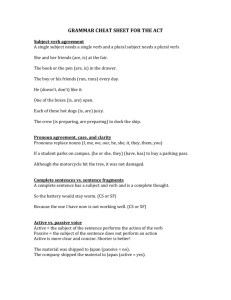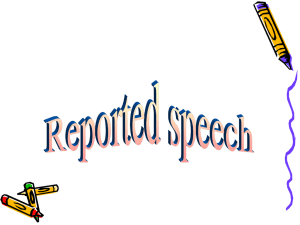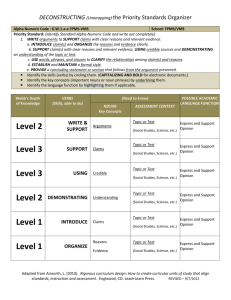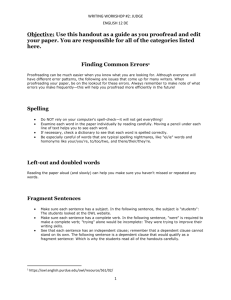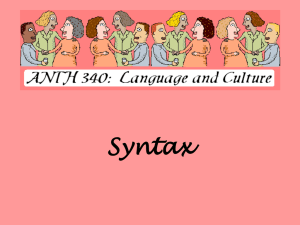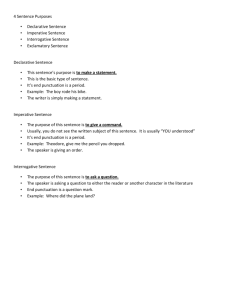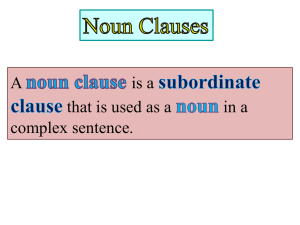Grammar-Handbook
advertisement
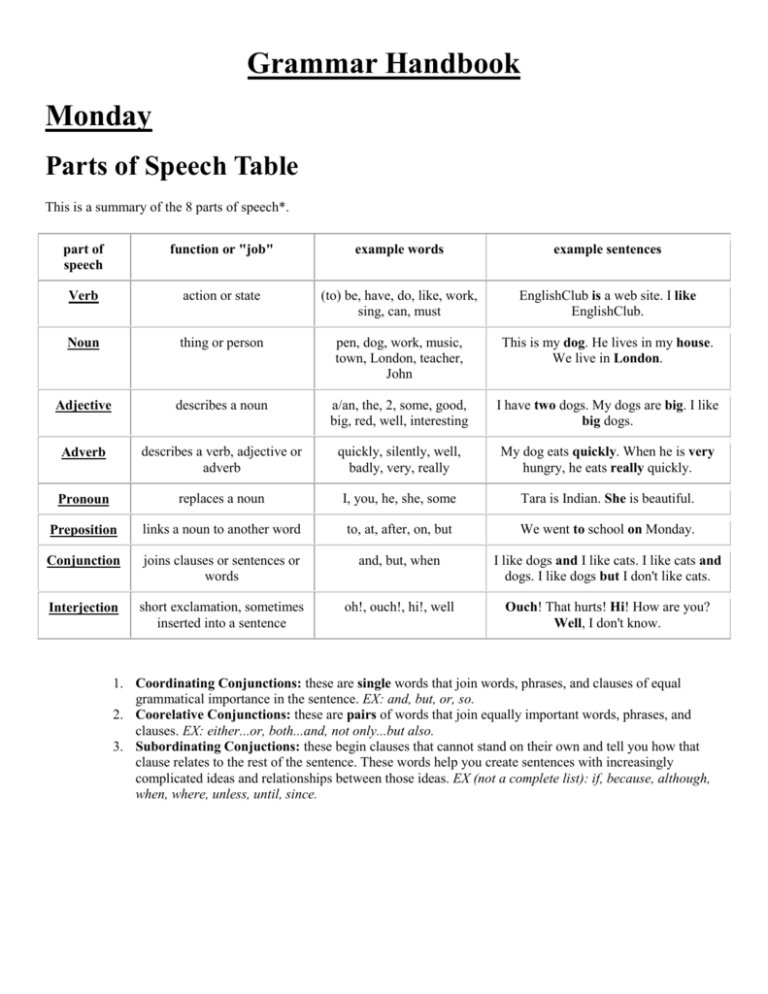
Grammar Handbook
Monday
Parts of Speech Table
This is a summary of the 8 parts of speech*.
part of
speech
function or "job"
example words
example sentences
Verb
action or state
(to) be, have, do, like, work,
sing, can, must
EnglishClub is a web site. I like
EnglishClub.
Noun
thing or person
pen, dog, work, music,
town, London, teacher,
John
This is my dog. He lives in my house.
We live in London.
Adjective
describes a noun
a/an, the, 2, some, good,
big, red, well, interesting
I have two dogs. My dogs are big. I like
big dogs.
Adverb
describes a verb, adjective or
adverb
quickly, silently, well,
badly, very, really
My dog eats quickly. When he is very
hungry, he eats really quickly.
Pronoun
replaces a noun
I, you, he, she, some
Tara is Indian. She is beautiful.
Preposition
links a noun to another word
to, at, after, on, but
We went to school on Monday.
Conjunction
joins clauses or sentences or
words
and, but, when
I like dogs and I like cats. I like cats and
dogs. I like dogs but I don't like cats.
Interjection
short exclamation, sometimes
inserted into a sentence
oh!, ouch!, hi!, well
Ouch! That hurts! Hi! How are you?
Well, I don't know.
1. Coordinating Conjunctions: these are single words that join words, phrases, and clauses of equal
grammatical importance in the sentence. EX: and, but, or, so.
2. Coorelative Conjunctions: these are pairs of words that join equally important words, phrases, and
clauses. EX: either...or, both...and, not only...but also.
3. Subordinating Conjuctions: these begin clauses that cannot stand on their own and tell you how that
clause relates to the rest of the sentence. These words help you create sentences with increasingly
complicated ideas and relationships between those ideas. EX (not a complete list): if, because, although,
when, where, unless, until, since.
Tuesday
Sentence Parts
PHRASE: a group of related words that does not have a subject, or does not have a predicate, or both. A phrase
acts collectively as a single part of speech, and is usually a noun, adject or adverb. EX: Noun phrase: The
winningest football team is at Greenville High. Adjective phrase: I went down the street with a smile on my face.
Adverb phrase: I went down the street more slowly than I ever had before.
There are, however, some special types of phrases:
Prepositional Phrases: prepositions and their objects and modifiers. EX: That book is on top of the bookcase.
Alice went through the looking glass.
Verbal Phrases: A verbal is a form of a verb that doesn't act as a verb. This is not as confusing as it sounds; we
all know that infinitive forms of verbs (to go, to be) do not function as verbs in that form. Phrases that include
verbals are gerund phrases, participial phrases, and infinitive phrases.
1. Gerund phrases: these always function as nouns. Their verbals are the present participle ("ing") forms
of verbs. EX: Lying around all day is the worst thing you can do in your condition!
2. Participal phrases: these always function as adjectives. Their verbals are present participles (the "ing"
form) or past participles (the "ed") form. EX: (Present) The book lying on the counter is overdue. (Past)
Tired from his workout, Jason rested for an hour.
3. Infinitive phrases: these can function as nouns, adjectives or adverbs. Their verbals are always infinitive
forms. EX: I have lost the chance to say I am sorry. To be a good friend is my goal.
SUBJECT: Who or what the sentence is about. The noun, pronoun, or group of words acting as a noun, that
performs the action indicated in the predicate of the sentence or clause. EX: Katie is going downtown. Stopping at
a red light is always a good idea.
PREDICATE: Basically, the rest of the sentence or clause other than the subject; it usually has a verb, and thus
indicates some action, but may have other functions such as modifying the subject. EX: Katie is going downtown.
Stopping at a red light is always a good idea.
OBJECT: A word or group of words which receives the action of a verb or that completes the description or
statement being made about the subject. Lots of confusing possibilities here; here are a few major ones.
1. Direct Objects: a word or group of words that follow transitive verbs (see above), and name the receiver
of the action. EX: I threw the baseball.
2. Indirect Objects: a noun or pronoun that come before or behind a direct object, and tells to whom or for
whom or what the action is done. EX: I gave the ball to Jack.
3. Subject complements: follow a linking verb (see above) and describe or complete the meaning of the
subject. These can be nouns (I am the manager), or adjectives (I am so stupid!).
4. Object complements: like a subject complement, but applied to something else: a word or group of
words that describes or completes a direct object's meaning. These can also be nouns or adjectives. EX:
Love makes the world a happier place. Yes, I am calling you ridiculous.
Wednesday
Clauses and Sentence Types
A clause is a group of related words that contains both a subject and verb. We have two primary types of
clauses.
o An independent clause expresses a complete thought, so it can stand by itself.
o A dependent clause, also known as a subordinate clause, expresses only part of a thought, so it
cannot stand alone.
A sentence is an independent clause that may or may not be combined with other clauses to convey a
complete, and sometimes complex, thought.
To determine whether a group of words is a phrase or a clause, you must be able to find the subject and predicate.
(Predicate is another term for a verb.)
The subject is the part of a sentence that tells who or what the sentence is about. To find the subject, ask
who or what is doing something.
The predicate is the part of a sentence that asserts something about the subject. It expresses action or
state of being. To find the predicate, ask what the subject is doing.
A direct object is something or someone that directly receives the action of the verb.
Example: What does Mary write? She writes letters, so letters is the direct object.
An indirect object is someone for whom or to whom the action is done.
Example: To whom does Mary write the letters? She writes to her grandparents, so grandparents is
the indirect object.
While we’re discussing sentences, you should know that there are four types of sentences: simple, compound, complex,
and compound-complex. The number of independent and dependent clauses determines the type of sentence.
A simple sentence contains one independent clause.
Example: Mary went to the store.
A compound sentence contains two independent clauses that usually are joined in one of two ways:
o A comma and coordinating conjunction (and, but, or, nor, for, so, yet)
Example: Mary went to the store, and she bought some bread.
o A semicolon
Example: Mary went to the store; she bought some bread.
A complex sentence contains one independent clause and one or more dependent clauses.
Example: Mary went to the store because she needed bread.
A compound-complex sentence contains two or more independent clauses and at least one dependent clause.
Example: Mary went to the store, and she bought some bread that she needed.
Thursday
Punctuation and Capitalization
Capital Letters
• All sentences begin with capital letters.
• The first word of a quoted sentence.
• Proper nouns begin with capital letters. (names of people, specific
monuments, cities, states, etc.)
Mr. Thompson asked if Anna would help.
• A person's title when it precedes his or her name (Dr. Richardson)
• High-ranking government officials (President Bush, Attorney General Smith)
• The pronoun I is always capitalized.
I want to go to San Francisco.
• A capital letter begins the first, last, and any important word in the title of
a book, magazine, song, movie, poem, or other work.
Read the first chapter of Kite Runner.
Punctuation Rules
Apostrophe (')
We use Apostrophes to replace a contracted letter.
She is(she's) / What is(What's)
Possessives:
With possessive -S, we use apostrophes.
Daniel's money / Nora's son.
Hyphens
Dash
Connect two independent words, so they function as one unit. Some compound words are hyphenated, some are
one word, and some remain two words.
• Water-repellent
Two words that are functioning together as an adjective require a hyphen between them:
• A well-known scholar...
Also, hyphens are always used with prefixes "self-" "all-" "ex-" and the suffix "elect-":
• A self-help clinic...
Dashes are usually used to set off information that would be in parenthesis
• Wikipedia-- a popular website--can be a good source of basic information.
Dashes can also be used to set off appositives (nouns or noun phrases that modify a nearby noun)
• Basic needs--food, clothes, and shelter--can be very expensive.
Dashes can also indicate a sharp break in the flow of a sentence, such as a list or shirt in tone:
• Oil can be made from many plants--palm trees, soybeans, sunflowers, peanuts, olives and coconuts.
Period '.'
A complete sentence that makes a statement ends with a period.
It's your birthday.
Most abbreviations end with a period.
Dr. Smith lives on Creek Rd. near St. Mary's Hospital.
Question Mark '?'
A question ends with a question mark.
When is she coming?
Exclamation Point '!'
The exclamation point is used at the end of a sentence to indicate great surprise. It is also used for emphasis when
making a point.
I can't believe he is going to marry her!
Comma ','
A comma separates things in series. (list of items)
I like reading, listening to music, taking long walks, and visiting my friends.
A comma separates an interruption from the rest of the sentence.
Mr. Walker, our teacher, is very clever.
A comma separates two independent clauses that are connected by a conjunction such as 'but'.
They wanted to purchase a new car, but their financial situation would not allow it.
Separate phrases (clauses)
In order to qualify for your certificate, you will need to take the TOEFL exam.
Introduce a direct quote (as opposed to indirect speech i.e. He said he wanted to come...).
His doctor replied, "If you don't stop smoking, you run the risk of a heart attack."
Colon ':'
A colon shows the reader that a list or explanation follows.
I will need the following items: scissors, paper, glue, and paint.
To introduce a direct quote (a comma can also be used in this situation)
He announced to his friends: "I'm getting married!”
Semicolon ';'
There are two uses for a semicolon:
1. To separate two independent clauses. One or both of the clauses are short and the ideas expressed are usually very
similar.
He loves studying; he can't get enough of school.
2. To separate groups of words that are themselves separated by commas.
I took a holiday and played golf, which I love; read a lot, which I needed to do; and slept late; which I hadn't done for
quite a while.
Quotation Marks (double " or single ')
Quotation marks are used to identify the exact words of a speaker.
President Bush said, "We will not tire, we will not falter, and we will not fail."
For speech within speech, the other style is used as inner quotation marks:
'Dave said, "Good afternoon, Frank"', recalled Frank.
Warning: Place the punctuation marks outside quotation marks, unless they are logically parts of the quotation.
His answer to this was "no"; but two years later, he changed his mind.
Did he say "yes" or "no"?
